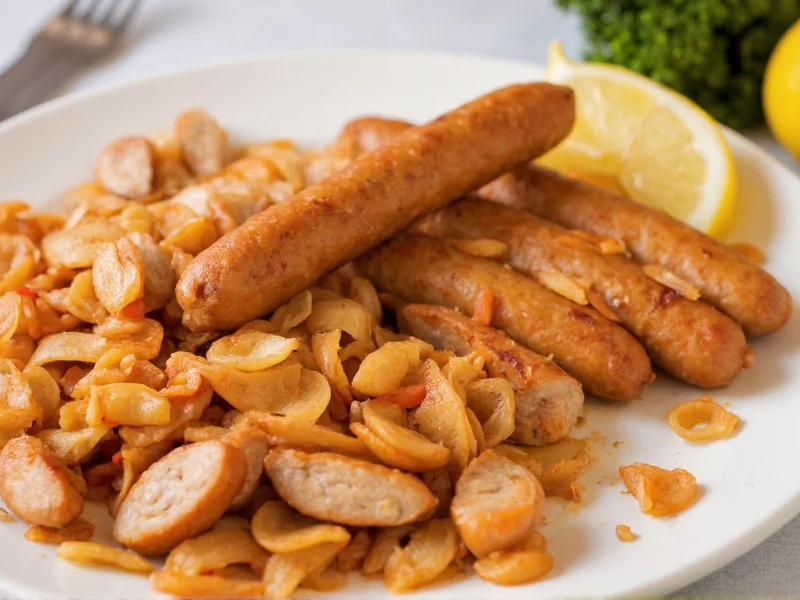For health-conscious breakfast enthusiasts seeking leaner protein options, chicken breakfast sausage delivers a flavorful alternative without sacrificing the savory experience of traditional morning sausage. This versatile meat product has gained popularity among fitness-focused consumers and those managing dietary restrictions, offering comparable taste with significantly improved nutritional metrics.
Nutritional Advantages Over Traditional Sausage
When comparing chicken vs pork breakfast sausage nutrition, the differences become immediately apparent. A standard 3-ounce serving of chicken breakfast sausage typically contains:
| Nutrient | Chicken Breakfast Sausage | Pork Breakfast Sausage |
|---|---|---|
| Calories | 180-200 | 290-310 |
| Total Fat (g) | 12-14 | 26-28 |
| Saturated Fat (g) | 3-4 | 9-10 |
| Protein (g) | 18-20 | 19-21 |
| Sodium (mg) | 450-550 | 500-600 |
The reduced fat content comes primarily from using chicken thigh meat blended with lean breast meat, creating a balance that prevents dryness while maintaining health benefits. Many commercial varieties now offer low sodium chicken breakfast sausage benefits with sodium content reduced by 25-30% compared to standard versions.
Essential Seasoning Profile
What makes chicken breakfast sausage distinct from regular chicken sausage is its specific spice blend. The best way to season chicken breakfast sausage includes:
- Dried sage (the dominant flavor in traditional breakfast sausage)
- Black pepper (freshly cracked provides superior texture)
- Thyme and rosemary (for earthy complexity)
- Nutmeg (a subtle warmth that enhances other spices)
- Red pepper flakes (optional for slight heat)
Unlike Italian or smoked chicken sausages, breakfast varieties avoid fennel and garlic, focusing instead on the classic breakfast sausage flavor profile that pairs perfectly with eggs and pancakes. For those following gluten-free diets, most chicken breakfast sausage options are naturally gluten-free, though checking labels for potential fillers remains advisable.
Optimal Cooking Methods
Understanding how to cook chicken breakfast sausage properly prevents dry, rubbery results. Unlike pork sausage, chicken sausage requires more careful temperature management:
- Pan-frying: Heat cast-iron skillet over medium heat (325°F). Cook patties 4-5 minutes per side until internal temperature reaches 165°F
- Baking: Arrange on parchment-lined baking sheet at 375°F for 18-22 minutes, turning once
- Air frying: 360°F for 10-12 minutes, shaking basket halfway through
Never pierce chicken sausage while cooking, as this releases precious moisture. For homemade versions, adding 15% chicken skin to your healthy chicken breakfast sausage recipe maintains juiciness without significantly increasing fat content. Always use a meat thermometer to verify doneness—chicken sausage must reach 165°F internally for food safety.
Versatile Recipe Applications
Beyond traditional breakfast pairings, chicken breakfast sausage shines in numerous culinary applications. Try crumbling cooked sausage into:
- Breakfast casseroles with sweet potatoes and kale
- Whole grain stuffing for roasted vegetables
- Breakfast burritos with black beans and avocado
- Quiches with goat cheese and spinach
For meal prep enthusiasts, storage tips for homemade chicken breakfast sausage include vacuum-sealing portions and freezing for up to three months. Thaw overnight in the refrigerator before cooking for best results. Pre-cooked patties can be refrigerated for 3-4 days in airtight containers.
Shopping Considerations
When selecting store-bought options, examine ingredient lists carefully. High-quality products should list chicken as the first ingredient with recognizable spices rather than 'seasoning blends' or 'natural flavors.' Avoid products containing:
- Excessive sodium (more than 500mg per serving)
- Artificial preservatives like sodium nitrite
- Sugar or corn syrup
- Fillers like soy protein isolate
Organic and air-chilled varieties typically offer superior texture and cleaner flavor profiles. For those exploring chicken breakfast sausage as part of a heart-healthy diet, look for options with omega-3 enriched chicken feed for additional nutritional benefits.
How does chicken breakfast sausage compare nutritionally to pork sausage?
Chicken breakfast sausage typically contains 30% fewer calories and 50% less saturated fat than pork breakfast sausage while providing comparable protein content. A 3-ounce serving of chicken sausage averages 180-200 calories with 3-4g saturated fat versus 290-310 calories and 9-10g saturated fat in pork sausage.
What's the proper internal temperature for cooked chicken breakfast sausage?
Chicken breakfast sausage must reach an internal temperature of 165°F (74°C) to be safely consumed. Use a digital meat thermometer inserted into the thickest part of the sausage to verify doneness, as color alone isn't a reliable indicator of safety.
Can I make chicken breakfast sausage at home without special equipment?
Yes, you can create excellent homemade chicken breakfast sausage using basic kitchen tools. Combine 2 lbs ground chicken thigh, 1 tbsp dried sage, 2 tsp black pepper, 1 tsp thyme, 1/2 tsp nutmeg, and 1/4 tsp red pepper flakes. Mix thoroughly, form into patties, and cook in a skillet over medium heat for 4-5 minutes per side.
How should I store leftover chicken breakfast sausage?
Refrigerate cooked chicken breakfast sausage in an airtight container for 3-4 days. For longer storage, freeze portions in vacuum-sealed bags for up to 3 months. Thaw frozen sausage overnight in the refrigerator before reheating to maintain texture and safety.
Why does my chicken breakfast sausage become dry when cooking?
Chicken sausage dries out when cooked at too high a temperature or for too long. Unlike pork sausage, chicken requires more careful heat management. Cook over medium heat (325-350°F), avoid piercing the sausage, and remove from heat when internal temperature reaches 160°F (it will continue cooking to 165°F while resting).











 浙公网安备
33010002000092号
浙公网安备
33010002000092号 浙B2-20120091-4
浙B2-20120091-4